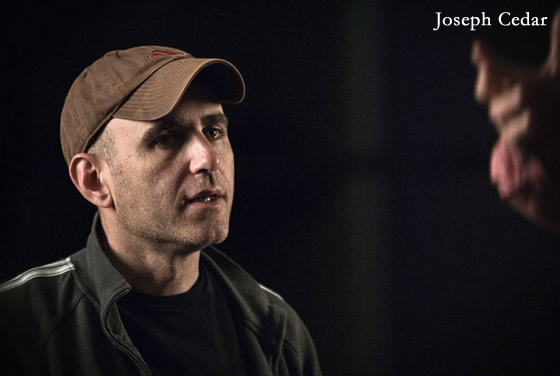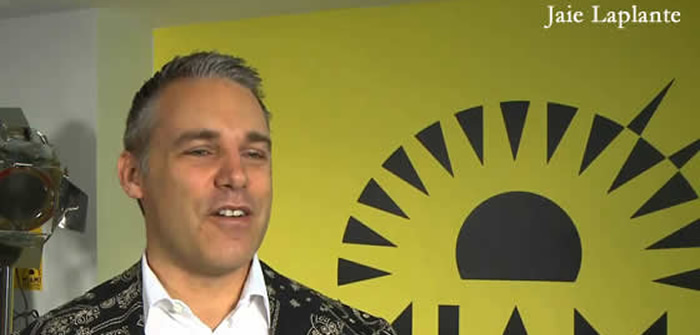 Miami Film Festival is coming up early March and to learn more about the festival we interviewed its Executive director and director of programming Jaie Laplante.
Miami Film Festival is coming up early March and to learn more about the festival we interviewed its Executive director and director of programming Jaie Laplante.
Jaie Laplante is an internationally recognized leader and influencer in film culture. As a critic and journalist in Canada in the late 1980s, he published more than 400 pieces on contemporary commercial and international art cinema for a variety of publications, and first championed his career-long efforts to organically connect regional audiences with homegrown artists, recognizing it as an essential component of maintaining and building the medium’s power. During this time, he became one of the western Canadian region’s most vocal advocates, urging audiences to support nascent successes, such as the 1980s oeuvre of Albertan Anne Wheeler (Loyalties, Bye Bye Blues), the first filmmaker from the province to be selected by Film Society of the Lincoln Center and Museum of Modern Art’s New Directors/New Films. In Toronto and Los Angeles in the 1990s, Laplante worked on numerous independent productions and developed screenplays, and received an Academy of Canadian Cinema & Television nomination for Best Adapted Screenplay for the made-in-Toronto film Sugar, directed by John Palmer.
With the dawn of the new century, Laplante arrived in Miami and emerged as a new curatorial voice for a complex and dynamic metropolis on the verge of a rapid cultural expansion. Laplante produced early award showcases for François Ozon and Gregg Araki and brought ahead-of-the-curve attention to numerous unheralded filmmakers who are today major talents, including Matteo Garrone in 2003 and Naji Abu Nowar in 2008. Since the fall of 2010, Laplante has directed Miami International Film Festival and significantly reshaped the personality of the Festival’s program, deepening the Festival’s commitment to being a primary portal into the United States for established and emerging Iberoamerican filmmakers and providing catalyst on US distribution sales and renewed industry interest in the event. He has successfully strengthened the Festival’s commitment as a strong platform for Miami and Florida filmmakers creating work of international caliber, produced tributes to Oscar-winners Susanne Bier and Fernando Trueba, and premiered more than 500 films to Miami audiences, including the award-winning hits Wild Tales, Conducta, Theeb, Deep City: Birth of the Miami Sound, Metegol, Brazilian Western, Reality, Juan of the Dead, Porfirio, Madrid 1987, Un cuento chino, Chico & Rita, Cafe de Flore, and Incendies. Laplante has juried at film festivals and on film panels in Santiago de Chile; San Jose, Costa Rica; Santo Domingo, Dominican Republic; and at Cleveland International Film Festival. He was appointed by mayor Carlos Gimenez to the Miami-Dade County Film & Entertainment Advisory Board in 2013.
Bijan Tehrani: Please tell us about the background of Miami Film Festival
Jaie Laplante: The mission of Miami Film Festival is to bridge cultural understanding and encourage artistic development by provoking thought through film. By bringing the best of world cinema to Miami, the Festival presents the city and the film industry with a singular platform that fosters creative and technical talent.
The Festival was founded by the non-profit Film Society of Miami, Inc.. Since its first edition, which opened on February 3, 1984, , films have been screened in a variety of theaters throughout the greater Miami area. By the sixth Festival in 1989, the Olympia Theater at the Gusman Center had become the official residence. As the 1990s drew to a close, administration of the Festival was transferred Florida International University for a brief period, and then in October 2003 to Miami Dade College (MDC), where it has remained since.
MDC has led the Festival through a period of tremendous growth and expansion, where it also become known under its other official name, Miami Film Festival, and shifted its event dates to annually open on the first Friday in March, and run for 10 concurrent days. The Festival’s programming voice, unique among U.S. film festivals, has gained recognition for its numerous discoveries, and has given out more than $1 million in cash awards to both established and emerging filmmakers
BT: How is the presence of the international cinema at the festival?
JL: Miami Dade College’s Miami Film Festival is considered the preeminent film festival for showcasing Ibero-American cinema in the U.S., and a major launch pad for all international and documentary cinema. This year, there are 40 countries represented and the 34th edition festival poster artist is the world renowned Argentinean designer, photographer, and graphic artist Juan Gatti, founder of Gatti Studios in Madrid.
BT: Do you have guest filmmakers attending the festival? 
JL: Yes, we have the two time Oscar nominated director Joseph Cedar for the film NORMAN: THE MODERATE RISE AND TRAGIC FALL OF A NEW YORK FIXER, the Danish filmmaker Lone Scherfig for THEIR FINEST, the Indian filmmaker Alankrita Shrivastava, the Swiss filmmaker Frédéric Mermoud for his film MOKA, the German filmmaker Jens Wischnewski, the Romanian-born French filmmaker Radu Mihӑileanu for THE HISTORY OF LOVE, and many more..
BT: Any international guests?
JL: Yes, festival will have Rossy De Palma, the Spanish actress, musician, fashion icon, and Almodovar muse, for her film TRAVELLING LADY.
BT: Are there any side events, such as seminars happening during the festival?
JL: Yes, apart from showcasing some quality driven films, the festival also aims in providing an educational vehicle to the community that includes a seminar series with Google called “Google Talks: Gender & Racial Gaps in Film & Tech” moderated by Kiva Reardon (TIFF & MFF programmer) and with keynote speaker Daraiha Green, the Google Diversity in Entertainment Ambassador. The panelist will consist of five very multi ethnic and well-rounded women that will touch on the topics of disrupting the status quo, asserting yourself professionally, why criticism matters, and subverting stereotypes with comedy. The google series will take place March 4th and 5th.
In addition to the Google series, the festival will be hosting four Master class seminar series from March 8th through March 11th that include a conversation with Oscar winning mentor Daveid Frankel and first time director Xavier Manrique to discuss the process of directing, producing, and directing a first feature film. The 2nd event will include a discussion on how to take a short story or a movie and make it into a good film. The 3rd part of the series will include a daylong event explaining the underlying theme in the feature film as well as a forum for discussion of how individuals can learn about Chinese culture and society through Chinese films. The last event in the series will focus on computer graphics, visual effects, production and distribution with some of the biggest names in the industry.
BT: How film fans can buy passes for the films and are there any discounts for the students of film-making?
JL: Students get a discount but you don’t necessarily need to be a filmmaking student. Tickets can be purchased online, via phone, or at the box office. Details provided below.

